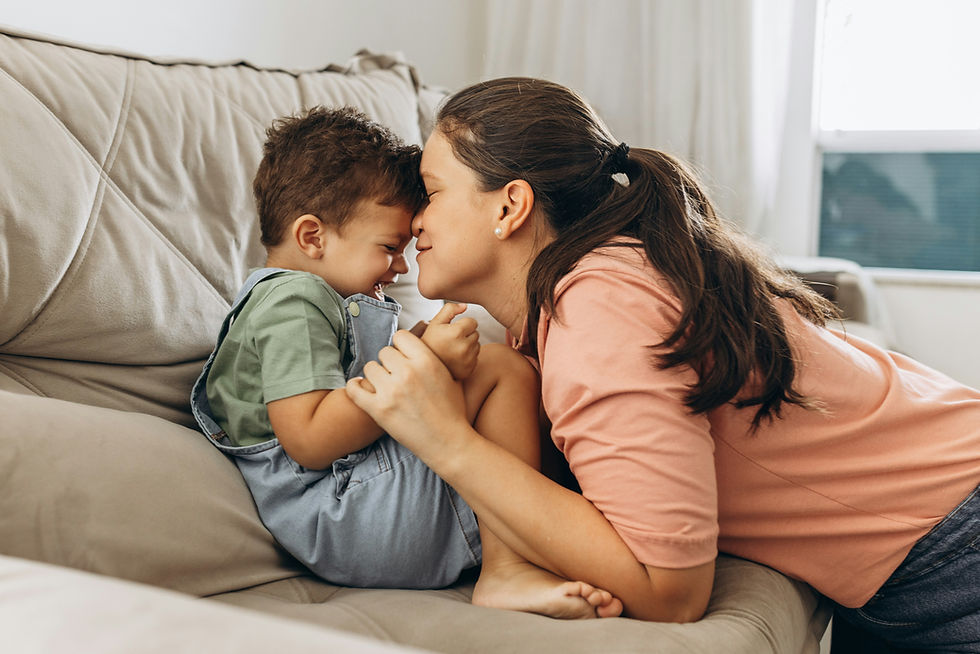Finding Perspective in Uncertain Times
- alicegray

- Mar 16, 2020
- 4 min read
Updated: Jun 6, 2020
Braving the Grocery Store

Yesterday I got to the grocery store at 7am in hopes of beating the crowds gearing up for the coronavirus. There were still spots in the parking lot—a good sign. In I went, determined not to touch my face, with a tiny bottle of hand sanitizer in my back pocket (the only one our family has). For the first 30 minutes, things felt normal. Employees were restocking shelves, and there were no empty bins in the fruits and veggies section.
But as I moved about the store, it grew more difficult to pass through aisles, and I noticed the empty shelves: few dried goods, canned beans, pasta, or paper products remained. I started to feel overwhelmed. I started to question what I needed and what I didn’t need. I saw a man wearing gloves. I saw how full his cart was.
The Fear Response

This article from La Mente Es Maravillosa (The Mind is Marvelous), a site dedicated to psychology and human behavior, discusses the direct relation between having our basic needs met and decreased levels of stress. So, with the possibility that any of us might have to self-quarantine for a couple of weeks at a time, our brain looks to what it can do to gain back control, to ensure our basic needs are met. That is a reasonable response.
But we are social beings. While we may have enough in our pantry to eat comfortably for a few weeks, when we see images online of people buying up all the toilet paper, when we see our neighbors putting away car loads of groceries, we start to worry that we don’t have enough, that we are being left out.
We begin acting from a place of fear rather than logic. We lose perspective.
Fear of Perceived Scarcity Creates Real Scarcity
When a society acts out of fear, we run the risk of creating the very problems we initially worried about. Stockpiling basic food and supplies creates temporary shortages and the potential for price gauging. Going to the grocery store all at once creates unnecessary crowds, potentially increasing the spread of the virus.
Psychologically, overbuying gives us a false sensation of control in times of uncertainty.
Ultimately, fear of scarcity creates scarcity.
Getting Through Uncertain Times as a Community

There is not a toilet paper shortage beyond the one we ourselves are creating. Many people are stocking up on supplies in the way they might to prepare for a hurricane—but this isn’t a 3-day disaster where we potentially lose electricity and roads are blocked. We need to figure out how to make sure everyone has toilet paper for months to come.
A spokesperson from HEB, Texas’s largest grocery store chain, told the Texas Tribune, “If we think long term, we can ease the panic ... if our customers just relax knowing that we are not going to completely run out of products, if we can just have the time to be able to restock our shelves."
Italy is on lockdown, and people are allowed to leave their homes only in small numbers at certain times to get necessities. Even under such extreme measures, the Italian grocery stores have not run out of supplies.
The actions we can take to protect ourselves are the same ones that will ultimately help us end this pandemic. Save the masks for public employees, for the sick, for our doctors and nurses on the front lines. Protect them, and you protect society, and ultimately yourself and your loved ones.
Finding Perspective

Back at the grocery store, I cut my shopping trip short when I see that the lines for check out have begun to stretch halfway across the store. I line up behind an abandoned cart and when the line begins to move forward, there’s a part of me that thinks, “This person lost out, maybe I should just push the cart aside and go around it.” But instead, I move the cart up with mine as the line progresses.
5 minutes later a mother with a baby strapped to her chest comes back to her cart, and she thanks me for holding her place. We exchange a knowing smile and my blood pressure levels out. I ask if she’ll watch my cart while I grab one more item, she nods. Admittedly, I head for the toilet paper.
Since it was early in the day there were still packages—I could have taken 3 or 4. But I took 1—an amount I came to from a place of reason, of perspective. My fear having been lifted by the smile from the mother in line with me.
Mi Casa Es Tu Casa® invites you to take many deep breaths. When you do, find a small thing to focus on that brings you joy (your child's smile, the smell of their hair, the softness of their skin). This will lower your cortisol levels and help you be calm, present, and centered—help you gain more perspective. Your child never stops scanning you to match your state of calmness (or anxiety). This is how they develop confidence in themselves and trust in the world around them.
Remember, we live in a place of abundance and this too shall pass.
Alice Gray is a writer and editor living in Austin, Texas. She has attended classes at Mi Casa es Tu Casa® since her daughter was 2 years old, and is a big believer in the benefits of early childhood movement, music, language, play, and connection.






Comments